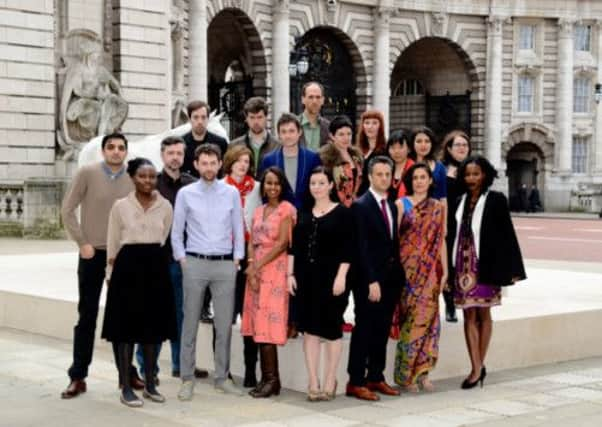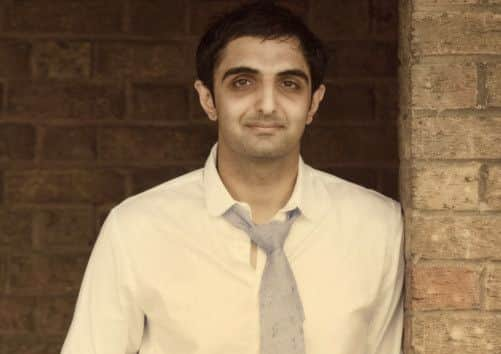Bright young things of literary world make it on to the list of ones to watch


IN 2003, when the influential quarterly literary magazine Granta published its last list of the Best of Young British Novelists, Ross Raisin was a student on a creative writing course at Goldsmiths College in London.
He worked as a waiter in his spare time while trying to write his first novel. Back then the idea of making it onto a list of the brightest young writers in the country was beyond his wildest dreams. “I saw the list that year and it was a fantasy, something to aim for,” he says. “It was hard to imagine you would ever get there, though.”
Advertisement
Hide AdAdvertisement
Hide AdSince then Raisin, who was born and grew up in Silsden near Keighley, has published two acclaimed novels. God’s Own Country (2008), the tale of a troubled young loner set in the Yorkshire Dales and written partly in dialect, won three awards (including Sunday Times Young Writer of the Year) and was shortlisted for six more.


Waterline, which used Glaswegian dialect and followed the struggle of a widower to come to terms with the harder edges of modern life, was published in 2011. Raisin’s short stories have appeared in a string of respected magazines and newspapers and on BBC Radio 3 and 4.
It’s safe to say that Raisin, now 33 and living in north London with his wife and small child, no longer waits on tables. Instead he grafts away with his laptop most days in one of a selection of local libraries.
By most yardsticks he is lucky, a success, and earning money from his art. But still, being selected from 150 writers to be on the newly announced Granta 2013 Best of Young British Novelists list was enormously exciting, he says.
Advertisement
Hide AdAdvertisement
Hide AdHe and the other listed writers have known for a couple of months that they were among those chosen from writers who either were already published or had a contract to have their work published. Sitting on the information has been difficult, but thrashing away in the library has to take priority, says the novelist, whose next book (dealing with perceptions and realities around life as a lower league footballer) will be published in 2014.
For the first time this fourth Granta list has tipped in favour of female writers (12 are women). “I feel it has in the past been more difficult to be taken seriously as a female writer, so the change is great,” says Raisin. “It’s more of a true reflection of who is writing, and hopefully there will come a point when gender, like ethnic background, is no longer a talking point.”
For Raisin, now that the glamorous West End party and mutual congratulations are over – the writers did not know who else was on the list until they met for the official announcement – the business of fulfilling expectations by giving birth to another successful novel must be his focus.
“I’m absolutely delighted and chuffed, but it has no impact on my day-to-day life. My ambitions are the same as they always were – mainly about focusing on making a particular piece of work the best it can be.”
Advertisement
Hide AdAdvertisement
Hide AdRoss Raisin is one of three novelists from Yorkshire to appear on the 2013 list. Sunjeev Sahota was born in Derby but lives in Leeds. His first novel, Ours Are The Streets, an exploration of religious fundamentalism from the point of view of one young husband and father, was published in 2011. Along with new work by the other listed novelists, excerpts from his next book, The Year Of The Runaways, are published in the current edition of Granta.
Also on the list is Steven Hall, whose first novel, The Raw Shark Texts, has been translated into 29 languages and won both the Borders Original Voices Award and the Somerset Maugham Award.
It tells the tale of Eric Sanderson, who loses his memory and while trying to put the pieces of his past together discovers he is under attack from a powerful force.
Hall, who lives in Hull, is 37 and became a novelist having gone to Sheffield University to study fine art. “I went in determined to be an artist, and came out with ambitions to write,” he says. His art had always been made around textual content, but the words took over and he left his studies yearning to teach himself to be a write a novel.
Advertisement
Hide AdAdvertisement
Hide AdIt took him almost six years to complete the first one. “I try to work very deeply into the story, but I also explore other kinds of writing, and have written and published a computer game called Crysis. I’ve had British Film Institute funding to develop a series of stories into an interactive iPad TV series.” The stories, or Phonebook, were inspired by the day job he had for a few years, putting together Hull’s version of Yellow Pages, Colour Pages.
Experimenting with the form of the novel is a passion of Hall’s, and his second novel, The End of Endings (which he hopes will be published in 2014), comes in four segments with two front covers and no back cover. Each part is both self-contained and causes the events in the next, and he says both form and content are influenced by the “bite-sized” communications of the digital age.
“Of the writers I like most, the one who most inspires me is Paul Auster,” says Hall. “His work is both cool and intellectual and emotionally honest. Not many writers pull that off – they’re either gripping and exciting or more experimental, cold and clever. It’s incredibly exciting when you find someone who does it all so well.”
Hall says the act of writing is like “fighting a four-headed monster” and appearing on a prestigious list won’t change that.
Advertisement
Hide AdAdvertisement
Hide Ad“We have a good record in crystal ball gazing with our lists and feel the authors on this year’s will have great longevity as writers,” says editor of Granta John Freeman.
The list was started in 1983 by library campaigner Desmond Clarke, who felt young writers did not get enough attention. Formulated initially as a marketing campaign, that year’s list comprised names who went on to become luminaries of British literature.
It brought Martin Amis, Kazuo Ishiguro, Salman Rushdie, Ian McEwan, Pat Barker, Rose Tremain, William Boyd and Julian Barnes to the attention of a large reading public. The 20 novelists had their books displayed prominently inside stores and in the windows of around 2,000 bookshops, including branches of WH Smith and John Menzies, as well as being stocked by about 1,000 public libraries.
Later lists have promoted the talents of names such as Will Self, Alan Hollingsworth and Zadie Smith – who is still under 40 and has appeared on the Granta list twice, including the latest one.
Advertisement
Hide AdAdvertisement
Hide Ad“Ross Raisin, Steven Hall and Sanjeev Sahota all meet the criteria in so many ways, “ says Freeman. “I look at their work – and that of the others on the list – and find myself feeling optimistic that we have such a breadth of styles and potential in this country.
“At least half to the list are known but not yet big sellers. The rest are newer and at the bottom of the slope of where they will eventually reach. Their talent demands a big audience.”
Jonathan Ruppin, web editor for Foyles booksellers, says the Granta list gave a fascinating snapshot of the state of British literary fiction.
“It’s the first time that female writers have formed a majority, which perhaps reflects the fact that women’s greater interest in reading fiction has inevitably led to more of them writing it,” he said.
Advertisement
Hide AdAdvertisement
Hide Ad“A comparison with the first list in 1983 reflects how multicultural Britain has become in the intervening decades, with writers from a far wider range of ethnic backgrounds making their mark,” says Ruppin.
“The British publishing industry is often criticised for being parochial, middle-class, white or London-centric, and while this may have been true in the past, I think this list shows how much our horizons have broadened.”
Ross Raisin belies the Granta list is a positive social force.
“It’s great that it is a reflection of multicultural life in this country, at a time when we are bombarded with ideas about the negative long-term impact of immigration.”
GRANTA BEST OF BRITISH 2013
Naomi Alderman
Tahmima Anam
Ned Beauman
Jenni Fagan
Adam Foulds
Xiaolu Guo
Sarah Hall
Steven Hall
Joanna Kavenna
Benjamin Markovits
Nadifa Mohamed
Helen Oyeyemi
Ross Raisin
Sunjeev Sahota
Taiye Selasi
Kamila Shamsie
Zadie Smith
David Szalay
Adam Thirlwell
Evie Wyld
Advertisement
Hide AdAdvertisement
Hide AdJudges – Granta editor John Freeman, deputy editor Ellah Allfrey, author Romesh Gunesekera, Stuart Kelly, literary editor of Scotland on Sunday, author and comedian AL Kennedy, Granta publisher Sigrid Rausing and journalist Gaby Wood.